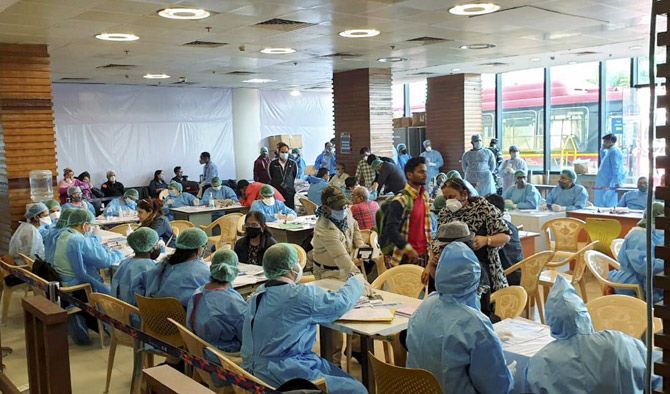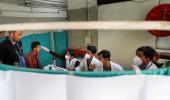'Anyone who takes the eye off the movement of the virus should be prepared for unpleasant surprises.'

"You need to keep a very close watch on where it is heading. I don't think anybody can be complacent. Having said that, there is really no need for panic so long as you are aware, informed and able to ensure that you are doing the best to protect yourself," Dr Om Shrivastav, Director, Infectious Diseases, at Mumbai's Jaslok Hospital, tells Archana Masih/Rediff.com.
As a doctor dealing with infectious diseases, what are your thoughts about the situation that you see around us?
My thoughts are mostly directed towards the safety of everybody. The importance of recognising your own responsibility towards a response to an infection like this and the recovery of those who are infected.
The government has taken terrific measures. The level of preparedness has been good so far. My thoughts are also about making sure that if there be a situation where this goes into epidemic proportions, I hope all concerned agencies will have the preparedness to tackle the volume of infections.
How crucial are the next two weeks going to be in India?
It is difficult to say. You read a lot of reports and messages about the temperature and climate, but you have to see what happened to each of these countries and how the model has gone on pretty much the same pattern from country to country. So I don't think that India will be spared.
I hope that all the projections are incorrect and the virus dies a natural death in the forthcoming weeks.
How crucial will the government's healthcare system and the common people's response be in dermining how the pandemic will play out in the country?
That will test out health care system and determine whether we are ready and prepared to handle the crisis.
Whether it can facilitate the requirements that will keep climbing with the number of cases. Whether we have enough labs, doctors, nurses, ventillators -- all of these will be tested.
Unfortunately, that is something we will know only when that moment arises and not before that.
But we have the level of preparedness for a situation that is approaching then we should be ready to meet the problem and give it the response that is required.
As a doctor, what would you like the government to do -- further from what it is already doing -- so that the pandemic doesn't go out of control in a densely populated country like India?
The government has done a terrific job so far.
The kind of preparedness in a state like Maharashtra -- which is the most affected state in the country -- the response has been quite spectacular.
What I would like is a preparation disaster plan that will be inclusive of not just learning from our past experience of epidemics, but also be prepared in a way that we do not wait for information and guideline coming from a different country.
We need to have this preparedness in our own country.
Do you feel unlike the 1918 epidemic, our relatively youthful population and hot temperature may result in reducing fatalities?
It is hard to say. More than anything else, it is important to have learnt from the last epidemic.
If we go back to SARS, MERS, H1N1, Zika -- all these have given everyone in the healthcare system a lesson about the level of preparedness required.
If we have learnt from them, we will be ready for the next epidemic.
This is not the first epidemic and it will not be the last.
If our level of preparedness is better than the last epidemic, then we have learnt our lesson.
How soon do you think private labs will be able to start testing?
That will have to be very quick. Kasturba hospital (central Mumbai) has demonstrated that you can have a turnaround time of four hours. In the last 10 days time it has been functioning 24x7 because of the volume of samples.
That is what private labs will also have to do. If they get a sample at 1 am in the morning, they should be able to tell the patient at 4 am what the result is.
The turnaround time, accuracy of results and information of patient population is going to be crucial. All that will impact the efficiency in dealing with the situation.
What would your advice to people be at this moment? Many are panicking, as a doctor what would you tell us?
The anxiety is understandable because it is a new virus. We don't know about it except from what we have seen in the last few months.
Everyday is a new learning. What we knew in January is different from what we know now.
Anyone who says she is not careful or wary about where it is heading is telling a story. We don't know enough to say that this virus is going to go in this direction.
Anyone who takes the eye off the movement of the virus should be prepared for unpleasant surprises because it is a sly and tricky virus.
You need to keep a very close watch on where it is heading. I don't think anybody can be complacent.
Having said that, there is really no need for panic so long as you are aware, informed and able to ensure that you are doing the best to protect yourself.
That is the best you can do. There is really no need for panic.
Why do you think there are so many cases in Maharashtra?
That is also difficult to say. The influence of geographical locations, temperature, humidity, movement of patients -- all these things will have a role.
This is an evolving story. You need to keep a close eye to see which way it is heading. It is difficult to say why so many cases in Maharashtra, but we will learn as more information comes.
How will the lockdown help in arresting the spread of new covid-19 infections?
The infection that gets transmitted from one person to another by contact. It means that a person who has got the infection touches a surface that surface transmits the virus because of contact with other people.
The whole principle of lockdown is to minimise the contact so that the cycle is broken.
A lockdown is for everybody's safety so that the least number of people are affected and 2, to break the cycle where person to person transmission does not happen.
How will the shutdown till March 31 impact the spread?
We are looking at the model where if you are able to stop the contact of one person to another you can arrest transmission. That is what we are hoping to achieve. So that the things that an infected person touches doesn't come into contact with other people and therefore you are able to arrest the infection.
How have the last few days been for you?
It has been engaging. That is why we practice clinical medicine and deliver our service to the best of our ability, irrespective of time of day.
With each new patient you learn something that will better equip us for the next patient and better the services of the hospital and find out where the gaps are and plug them as soon as possible.
On Sunday, people clapped for all the healthcare workers and staff at the forefront of battling the disease. What is the mood among those working with covid-19 patients?
It is natural to be cautious and apprehensive. You need to encourage those working with you. They look up to you to provide direction and for them to know that you are one of them.











 © 2025
© 2025